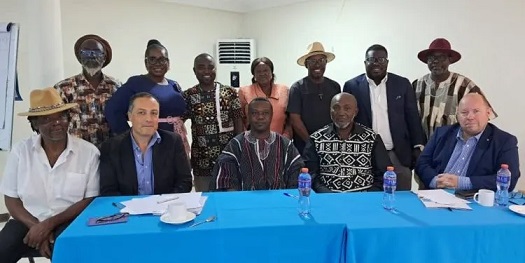The Musicians Union of Ghana (MUSIGA) is making significant strides in ensuring better financial stability and fair compensation for its members by proposing the introduction of a minimum wage for musicians. This groundbreaking initiative aims to address longstanding issues of underpayment and financial insecurity that many Ghanaian musicians face, regardless of their popularity or success in the industry.
Background and Rationale
For years, Ghanaian musicians have grappled with inconsistent and often inadequate pay for their performances and creative work. Many artists, especially emerging ones, struggle to make a living solely from their music due to low wages and the lack of standardized pay structures. This situation has led to numerous challenges, including financial instability and a decrease in morale among musicians.
MUSIGA’s decision to advocate for a minimum wage is seen as a necessary step to protect musicians’ rights and ensure they are fairly compensated for their contributions to the entertainment industry. The union believes that by establishing a minimum wage, they can help uplift the standard of living for musicians and encourage more young talents to pursue careers in music without fear of financial hardship.

Implementation and Expected Impact
The proposal for a minimum wage involves comprehensive consultations with key stakeholders, including musicians, event organizers, record labels, and government agencies. MUSIGA is working on developing a fair and sustainable wage structure that reflects the economic realities of the industry while providing adequate compensation for artists.
MUSIGA President, Bessa Simons, emphasized the importance of this initiative, stating, “Introducing a minimum wage for our members is not just about fair pay; it’s about valuing the hard work and creativity that musicians bring to the industry. We believe this will encourage more professionalism and dedication among artists.”
Once implemented, the minimum wage is expected to have several positive impacts:
- 1. Improved Financial Security
Musicians will have a guaranteed baseline income, reducing financial stress and enabling them to focus more on their creative processes.
- 2. Enhanced Professionalism
With standardized pay, musicians can demand better contracts and conditions, leading to more professional engagements and performances.
- 3. Talent Retention
A fair wage system will attract and retain more talents in the industry, fostering growth and innovation in Ghanaian music.
Industry Reactions
The announcement has been met with widespread approval from many within the music industry. Established artists see it as a long-overdue recognition of their work, while emerging talents view it as a beacon of hope for a more secure future in music.
However, there are challenges ahead. Event organizers and promoters have raised concerns about the potential increase in operational costs, which may affect the number and scale of events they can host. MUSIGA has assured these stakeholders that the union will work collaboratively to find a balanced approach that benefits all parties involved.
Moving Forward
As MUSIGA continues to refine the details of the minimum wage proposal, the union calls on all musicians to support this initiative and participate in discussions to ensure it meets their needs and expectations. The introduction of a minimum wage marks a significant milestone in the fight for fair treatment and compensation in the Ghanaian music industry.